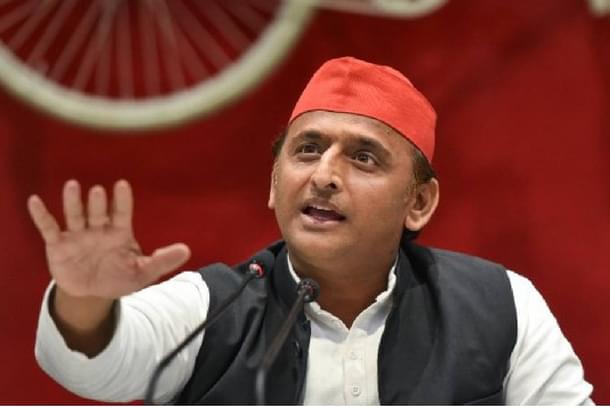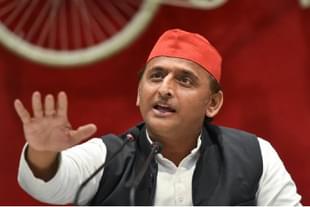Uttar Pradesh
Will Samajwadi Party Lead INDIA In Uttar Pradesh? With Challenges Looming, Aims To Prove Itself In MP Elections
Nishtha Anushree
Aug 28, 2023, 03:30 PM | Updated 03:30 PM IST
Save & read from anywhere!
Bookmark stories for easy access on any device or the Swarajya app.


The Samajwadi Party (SP) President Akhilesh Yadav revealed the candidates for the Dhauhani and Chitrangi constituencies, both reserved for Scheduled Tribes (STs), in Siddi district within the Vindhya region of Madhya Pradesh. These constituencies are situated close to the border with Uttar Pradesh.
Earlier, the party had also unveiled its candidates for the Mehgaon, Bhander (SC), Niwari, and Rajnagar seats in the Bundelkhand and Gwalior-Chambal belts, which are geographically proximate to Uttar Pradesh.
Among these, the Congress had secured victory in three and second place in two seats during the 2018 Assembly elections. The SP won one seat of Bijawar and is now eyeing more seats, while contesting against both the Congress and the BJP in these areas.
Notably, SP is part of the INDIA alliance which is currently being led by Congress. Despite this, the SP decided to contest against Congress in MP, so that it has a bargaining chip in Uttar Pradesh during the seat-sharing discussion for Lok Sabha elections 2024.
The SP state president in Madhya Pradesh, Ramayan Singh Patel, has already ruled out the possibility of forming an alliance with the Congress for the Assembly elections.
Meanwhile, the Congress has pledged not to field a candidate in the Ghosi Assembly by-poll in Uttar Pradesh, extending support to the SP's nominee. This again highlights the fact that being the largest party Congress is making all compromises to keep the alliance running.
However, UP's newly appointed Congress president Ajay Rai's assertions of Rahul Gandhi contesting from Amethi and projecting him as another Prime Minister of the nation from Uttar Pradesh has worried the SP, which intends to lead the alliance in UP.
SP has numbers in the state assembly which makes it the predominant Opposition force within the INDIA alliance in Uttar Pradesh. However, the complexities of coalition politics in UP raises some challenges.
While, behind closed doors in Lucknow, the SP leadership has expressed eagerness to play a pivotal role in the negotiations for seat-sharing among the alliance partners in UP, smaller parties have also indicated that they need a larger share.
Rashtriya Lok Dal (RLD) leaders have expressed concerns that national parties frequently seek support from smaller parties before elections but renege on commitments afterward.
This critique is directed at the SP, with RLD leaders asserting that Akhilesh Yadav's leadership did not provide sufficient opportunities to RLD candidates in the Legislative Council Elections.
On the other hand, Apna Dal (Kamerawadi) underscores the importance of addressing the aspirations of Other Backward Classes (OBCs) within the INDIA coalition.
Akhilesh Yadav has also indicated his party's inclination to lead the Opposition alliance in the state and, in the event of victory, secure a significant share in the government.
Currently, out of Uttar Pradesh's 80 Lok Sabha seats, the BSP holds nine, the SP has three (after losing two in by-elections), and the Congress possesses the sole seat of Rae Bareli. With 111 MLAs in the Vidhan Sabha, the SP leads the alliance in terms of legislative support.
In the 2019 elections, the SP, along with the BSP and the Rashtriya Lok Dal (RLD), formed the "Mahagathbandhan." While the SP contested 37 seats, the BSP and the RLD contested 38 and three seats respectively. The Congress was allocated two seats.
Although the SP secured victories in only five of the 37 contested seats, it claimed the second position in 31 seats. Akhilesh Yadav himself emerged victorious from the Azamgarh parliamentary seat, which he later vacated following the 2022 Assembly elections where the SP faced defeat in the Azamgarh by-election.
Maintaining political supremacy in UP presents a formidable challenge for the SP due to the intricate political dynamics of the state. While forming alliances may be straightforward, sustaining them after elections often proves intricate, as smaller parties may shift loyalties based on their political calculations.
This was seen after the 2022 assembly elections as Om Prakash Rajbhar-led Suheldev Bharatiya Samaj Party (SBSP) broke its alliance with the SP to join National Democratic Alliance (NDA).
The negotiation of seat-sharing agreements looms as another potentially contentious issue among the INDIA coalition partners. While formal discussions on the seat-sharing formula are pending, preliminary dialogues among leaders have initiated the discourse.
The Congress is poised to contest 15-20 seats in UP, particularly as reports suggest potential Muslim support in the Lok Sabha elections. Signals indicate potential candidacies of Priyanka Gandhi from Sultanpur, Rahul Gandhi from Amethi, and Sonia Gandhi's re-election pursuit from Rae Bareli.
Additionally, the Congress is eyeing Pratapgarh, where Aradhan Shukla "Mona," the leader of the Congress Legislature Party in the Vidhan Sabha, might enter the electoral arena.
The RLD also aims to secure 12 seats in the western region of UP, leveraging caste dynamics. Public meetings for Jayant Chaudhary have been scheduled across 12 parliamentary constituencies, including Mathura, Kairana, Muzaffarnagar, Meerut, Bulandshahr, Aligarh, Amroha, Fatehpur Sikri, Baghpat, Aligarh, Hathras, and Bulandshahr. These events aim to underscore RLD's influence and exert pressure on the INDIA coalition partners.
As the 2024 Lok Sabha elections draw nearer, the political landscape of Uttar Pradesh remains fluid, with leadership aspirations and seat-sharing negotiations poised to shape the state's political trajectory.
Nishtha Anushree is Senior Sub-editor at Swarajya. She tweets at @nishthaanushree.




